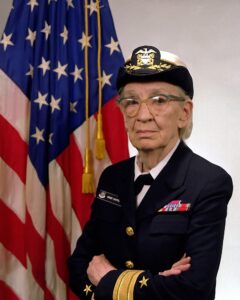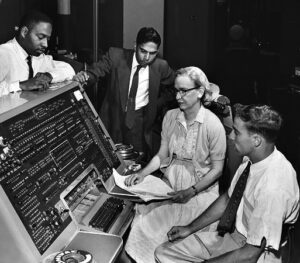 Very often, those we would least expect to rise to greatness, show us just how wrong we were. Grace Murray Hopper, at a very young age showed an interest in engineering. She could often be found taking household goods apart. Still, lots of kids have taken things apart, but then Grace would put them back together too. Still, her family had no idea that her curiosity would eventually gain her recognition from the highest office in the land. She was just a curious kid…right? Well, maybe not.
Very often, those we would least expect to rise to greatness, show us just how wrong we were. Grace Murray Hopper, at a very young age showed an interest in engineering. She could often be found taking household goods apart. Still, lots of kids have taken things apart, but then Grace would put them back together too. Still, her family had no idea that her curiosity would eventually gain her recognition from the highest office in the land. She was just a curious kid…right? Well, maybe not.
Hopper was born in New York City on December 9, 1906. She started out in the normal educational way, attending a preparatory school in New Jersey. Then after her high school education ended, she began her journey to greatness. She enrolled at Vassar College. After graduating with her Bachelor’s degree, Hopper went to Yale University, where she earned her Master’s degree and PhD in Mathematics. The she went on to teach at Vassar College.
So, in 1943, Hopper resigned her position at Vassar to join the Navy WAVES (Women Accepted for Voluntary Emergency Service). She felt a higher calling. In 1944, she was commissioned as a Lieutenant (Junior Grade) and assigned to the Bureau of Ordnance Computation Project at Harvard University. She was on her way to that greatness. Her team worked on and produced an early prototype of the electronic computer, called the Mark I. She also wrote a 500-page Manual of Operations for the Automatic Sequence-Controlled Calculator, outlining the fundamental operating principles of computing machines. It was also Hopper that came up with the term “bug” to describe a computer malfunction. We all know that term these days.
When World War II was over Hopper went on to become a research fellow on the Harvard faculty, and in 1949,  she joined the Eckert-Mauchly Corporation, so she could continue her pioneering work on computer technology. When you see things like UNIVAC, the first all-electronic digital computer, think of Hopper. She also invented the first computer compiler, a program that translates written instructions into codes that computers read directly. The work she did on the compiler led her to co-develop the COBOL, which was one of the earliest standardized computer languages. COBOL allows computers to respond to words in addition to numbers. It was an important step into a new era. Along with her work on computers and technical innovation, Hopper also lectured widely on computers, giving up to 300 lectures per year. She saw a world where computers were mainstream. In fact, she predicted that computers would one day be small enough to fit on a desk and people who were not professional programmers would use them in their everyday life. As we all know, that is exactly what has come to pass.
she joined the Eckert-Mauchly Corporation, so she could continue her pioneering work on computer technology. When you see things like UNIVAC, the first all-electronic digital computer, think of Hopper. She also invented the first computer compiler, a program that translates written instructions into codes that computers read directly. The work she did on the compiler led her to co-develop the COBOL, which was one of the earliest standardized computer languages. COBOL allows computers to respond to words in addition to numbers. It was an important step into a new era. Along with her work on computers and technical innovation, Hopper also lectured widely on computers, giving up to 300 lectures per year. She saw a world where computers were mainstream. In fact, she predicted that computers would one day be small enough to fit on a desk and people who were not professional programmers would use them in their everyday life. As we all know, that is exactly what has come to pass.
While her time of active service to her country was behind her, Hopper retained her affiliation with the Naval Reserve throughout her latter career. Moving up, she attained the rank of Commander by 1966. Then, as happens in the reserves sometimes, Hopper was called back to active duty in 1967. She was assigned to the Chief of Naval Operations’ staff as Director of the Navy Programming Languages Group. Hopper continued to move up the ranks, reaching the rank of Captain in 1973, Commodore in 1983, and Rear Admiral in 1985. She  basically had two great careers. In 1987, she was awarded the Defense Distinguished Service Medal, the highest decoration given to those who did not participate in combat. It was a moment to be very proud of.
basically had two great careers. In 1987, she was awarded the Defense Distinguished Service Medal, the highest decoration given to those who did not participate in combat. It was a moment to be very proud of.
While her military career had been amazing, her work with computers wasn’t anything to make light of either. She not only gained national attention, but she was recognized internationally for her work with computers. In 1973, Hopper was named a distinguished fellow of the British Computer Society. At that time, she was the first and only woman to hold the title. Hopper retired, but she couldn’t really retire, so she returned to the classroom, where she taught and inspired students until her death on January 1st, 1992. Throughout her life, Hopper had many career accomplishments, but she later said that her greatest joy came from teaching. In 2016, Hopper was posthumously awarded the Presidential Medal of Freedom. Her body is interred at Arlington National Cemetery.


Leave a Reply